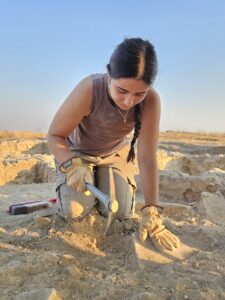
With trowel and brush in hand, University of Mary Washington senior Cynthia-Rose Seeds carefully cleared soil from a cremation urn she’d just uncovered at Corinth’s ancient port of Lechaion in Greece. It was one of many discoveries during a summer of fieldwork that gave the classical archaeology major firsthand experience in excavation.
Seeds was one of several UMW students who joined the Lechaion Harbor and Settlement Land Project this summer, where archaeologists are investigating Roman-period workshops, tavernas and basilicas. Working directly alongside professionals and faculty, the students helped with excavation, hauling and sifting soil, cleaning and sorting pottery fragments, and documenting discoveries through field notes and photographs.
In addition to unearthing the urn, the summer excavation provided many unforgettable discoveries for Seeds. Her most notable findings included Byzantine glass, coins, a basin-shaped carving and a “squatter’s wall,” an altar-like platform of baked tiles tucked into a corner of the dig site.
“Going out and excavating myself was so different from studying in the classroom,” Seeds said. “When I was doing it, that’s when I truly grasped and appreciated it, beyond just a mental understanding. It solidified my desire to get a master’s degree and go into archaeology as a career.”
Eve Stewart, a sophomore who plans to major in classical studies, said the long days of digging were demanding but rewarding. “It was hot and very tiring, but we were out in nature, had amazing views of the sunrise every morning and found loads of amazing artifacts,” she said. “I loved every second of working in the field.”
Her group spent nearly two weeks uncovering an animal skeleton and later found multiple coins dating from the fourth and fifth centuries. “Being part of this dig was definitely a once-in-a-lifetime experience,” Stewart said. “I’m now leaning toward working in a museum where I can work hands-on to preserve and research artifacts found in the field.”
The students’ work was guided by adjunct instructor Abigail Bradford, a Ph.D. candidate in Mediterranean art and archaeology at the University of Virginia. Bradford taught Archaeology of Sound at UMW last spring and will offer Introduction to Archaeological Methods this fall. In addition to teaching, she serves as a trench supervisor at Lechaion.
“The staff were always excited when they had UMW students in their trench,” Bradford said. “They were hands-down some of the brightest, most helpful and hardest-working on the team.”
UMW recently brought together the disciplines of anthropology, art history, classics, philosophy and religion in a newly named Department of Cultural and Philosophical Inquiry. The change expands opportunities for students, including courses in archaeological methods and bio-archaeology – the study of human remains as part of the archaeological record.
“It’s instrumental to our new department’s efforts to expand our offerings in archaeology in response to the interests of students in classics, anthropology and art history,” said Professor of Anthropology and Associate Dean of Humanities and Social Sciences Laura Mentore. She added that the students’ summer research not only contributed to international scholarship but also helped them develop skills in teamwork and critical analysis.
Department Chair and Professor of Art History Julia DeLancey agreed. “It was a marvelous summer archaeological experience for our students and just the kind of opportunity we hope our new departmental composition is able to facilitate,” she said. “Archaeological fieldwork is, in many ways, one of the bedrocks of our understanding of what it means to be human.”
Cynthia-Rose Seeds received the George M. Van Sant and Marsha Lynn Wilkins Endowment for Classics, Philosophy and Religious Studies, Kathleen Johns Turner Scholarship in Classics and the Lettie Pate Whitehead Scholarship.
To learn more, visit UMW Undergraduate Research Opportunities or Lechaion Harbor and Settlement Land Project webpages.




